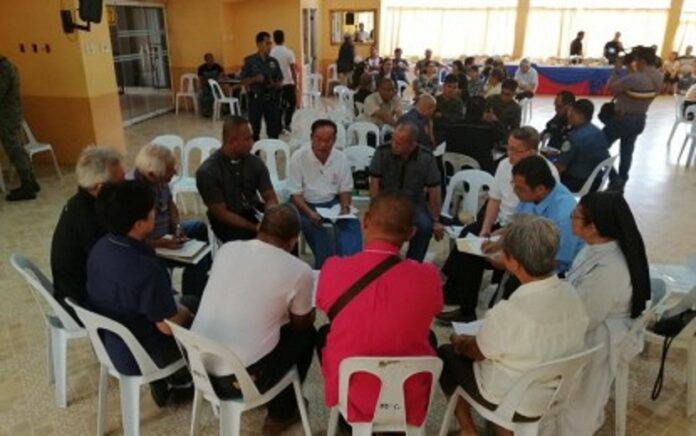Leaders from different sectors in Negros Oriental signed on Wednesday a manifesto of solidarity, pledging to support the provincial government and security authorities and provide assistance at their own levels and capacities, to end the recent spate of killings in the province.
Bishop Louie Galbines of the Diocese of Kabankalan (Negros Occidental), the keynote speaker during the multi-sectoral dialogue at the Marian Priests’ Center here, called for unity and concrete actions to save lives and to bring peace in the land.
“We cannot remain as bystanders when we hear of the people being killed in cold blood by ruthless murderers who dispose of human lives like trash,” he said.
“We are here because we recognize our responsibility to one another, to the victims, to the neighbor (like) the Good Samaritan. We are here to affirm our humanity and faith,” the prelate added.
More than 100 participants at the event initiated by the Diocese of Dumaguete, headed by Bishop Julito Cortes, made their respective commitments following a brief consultation and dialogue done in small groups that were divided according to their affiliation, advocacy and sectoral membership.
Each group presented individual and common concerns on the killings, the impacts and effects on their tasks and functions, and recommendations on how to help the provincial government achieve a holistic approach to end the violence prevailing in Negros Oriental.
The province headed by Governor Roel Degamo is leading the Provincial Task Force (PTF) to End Local Communist Armed Conflict (ELCAC), a local counterpart to the national level security strategy, to address the insurgency in the province.
Police and military officials have said cases are still being investigated for other motives as it is not conclusive that most of the killings in recent weeks were perpetrated by the Communist Party of the Philippines-New People’s Army (CPP-NPA).
Regardless of the nature of the killings, the participants pointed out several issues that have to be addressed, particularly the threat to lives and property as well as the fear now prevailing in the communities.
The religious sector, as well as the non-government organizations, expressed apprehension over the so-called “red tagging”, where many are being allegedly monitored and are under surveillance by the military and the police for their alleged links to the insurgents.
Nancy Estolloso of Tuburan Foundation expressed concern, saying they have no choice but to be up in the mountains because their advocacy is to attend to the needs of the poor.
Greg Fernandez of the Negros Oriental Network of NGOs or NegOrNet agreed, saying that majority of their members are into socio-economic development projects and spend as much time in the hinterland areas.
He pointed out that they in the civil society sector only play a “complementary” role as he urged government agencies to improve and fast-track the delivery of basic needs to the rural areas because poverty is the root cause of all these problems.
Dr. Socrates Villamor, who heads the Department of Health in Negros Oriental, disclosed that medical and health workers in the rural areas fear when they treat a person with gunshot wounds because they are wary of that person’s identity.
Villamor said the hospitals are required to report to the police incidents like these but medical workers are apprehensive of retaliation. “As to health services, these have been really hampered because of the peace and order situation in the province, especially in the interior barangays,” he said.
He disclosed that they have ordered their health workers not to go to “critical barangays” during these times for security reasons.
A representative from the Department of Education (DepEd) who declined to be identified, reported that the education sector is highly affected by these killings because students no longer attend school, while teachers assigned to the rural barangays are now fearful.
The DepEd official believes there is insufficient information coming from the police or military to keep the people abreast with the real scenario in the province, saying “do we need to (feel) fear or do we feel secure”?
From the Department of Trade and Industry, a representative added that a worker in one of the Negosyo Centers has asked to return to this city following another killing incident in Guihulngan, and is currently still here. There is fear because there are job orders assigned throughout the province, she said.
In the business sector, some investors have been calling the Negros Oriental Chamber of Commerce and Industry asking about whether it was still safe to go to the province.
From the media sector, those present agreed that the number one concern they are facing is the threat to their lives. They said they were there to provide factual and accurate information and to stay neutral, but there are times when their identities are questioned by either from the side of the government, such as the police and the military, or the NPA or militant groups.
They also lamented that because uncontrolled and unregulated posts on social media by the public and those claiming to be in the news media contribute to the confusion.
The journalists also appealed to government authorities, agencies, NGOs and other sectors to make themselves available for interviews and provide them with the necessary information to share to the public on peace and order matters.
Msgr. Glenn Corsiga, Vicar General of the Diocese of Dumaguete, designated as in charge of the multi-sectoral dialogue, said that inputs from the dialogue are being collated into one comprehensive document that will reflect the sectors’ concerns to be forwarded to the provincial government.
“We drafted a manifesto for us to sign so we can accommodate our sharing and views so we can tell our people what we can do at our respective sectors. This letter of support to the provincial government, the PNP and military for all the efforts that they are doing, and our pledge of support can only be completed when we do something in our respective levels,” Corsiga said.( Mary Judaline Partlow via NDB)

